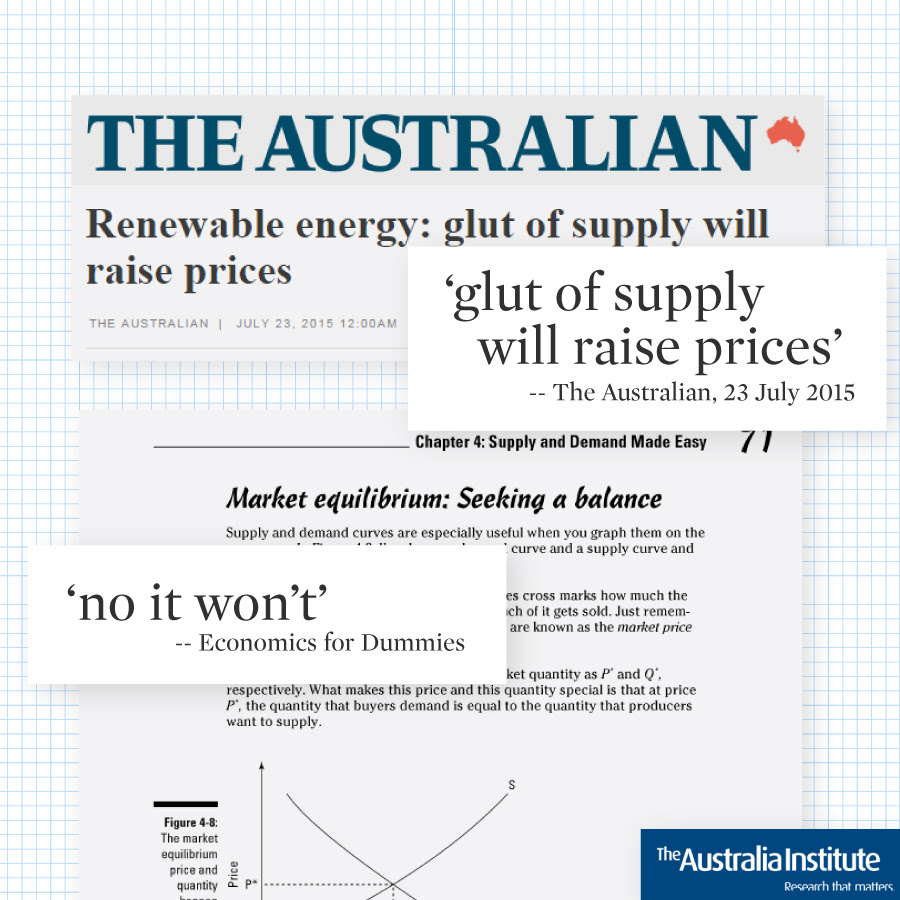| Dear Neville –The Australia Institute is incredibly pleased to announce that we’re sponsoring world renowned author and activist Naomi Klein at the Melbourne Writers’ Festival in August.
For many, Naomi Klein needs no introduction, but for those who haven’t encountered her work, she is the author of paradigm-breaking books including No Logo, The Shock Doctrine and most recently This Changes Everything: capitalism vs. the climate. One of the world’s top intellectuals, Klein has recently turned her focus to the strategies behind campaigning and activism.
Naomi Klein down under

In her 2014 book This Changes Everything: Capitalism vs the Climate Naomi Klein argues that those who see climate change as something that can be addressed without disrupting the status quo, have missed the point. Her inconvenient truth is that it is not about carbon, it is about capitalism: ‘Our economic system and our planetary system are now at war’. As capitalism depends on economic growth, which is fundamentally incompatible with significant emissions reduction, a whole new approach is required. Her proposition is that this confrontation can become the catalyst for radical positive change and the chance to build something better – a safer, fairer, more equal world.
The Australia Institute is proud to support bringing Naomi Klein to Australia. Stay tuned for further festival news and announcements in the coming weeks.
Dates:
Saturday 29 August, Federation Square, Melbourne – An audience with Naomi Klein
Sunday 30 August, Federation Square, Melbourne – Naomi Klein: Capitalism & the Climate
Book now @ mwf.com.au/writers/naomi-klein
ALP back Buffett Rule
This past weekend, The Australia Institute was in Melbourne to present a seminar at the Fringe of the ALP National Conference. The seminar was called: How to win an economic argument against a right-wing shock jock. It was standing room only as Richard Denniss and Ben Oquist joined Terri Butler in dismantling some of the econobabble which continues to get play in Australian politics.
While we were there we continued our efforts promoting fair, progressive tax reforms. One such proposal was brought forward by Anthony Albanese as a motion in support of a ‘Buffett Rule’ for Australia.
Albanese referred to a report produced for GetUp! by The Australia Institute, which modelled the effect of a minimum tax rate for the highest income earners to limit excessive claiming of tax deductions. The motion was passed.
The report author, our Senior Economist, Matt Grudnoff, wrote this explainer of the Buffett Rule for The Guardian:
“In 2011-12 75 people who all earned more than a million dollars paid no income tax. Nil, zilch, zip, nada. Between them they earned $195m and paid not a cent in tax. They did this by filing huge deductions, reducing their taxable income to almost zero. While they were very keen not to pay tax they were far more generous when it came to buying tax advice. On average these 75 people paid $850,000 each for tax advice, an amount beyond the means of almost all Australians.”
Read the full article here.
Handy armour for the upcoming renewable energy scare campaign
The ALP’s announced 50% renewable energy target drew a predictable response. But even so, the latest great big scare campaign on everything is on and may yet, like so many before it, be successful. Here are a couple of important facts that should be part of any discussion of the merits of increasing renewable energy:
Price of power
Even a review conducted by a ‘climate sceptic’ admitted that increased renewable energy put downward pressure on power prices.
The Australian newspaper responded to Labor’s policy by redefining one of the fundamental principles of economics. Contrary to centuries of conventional wisdom, the paper believes that increasing supply actually increases prices. All the economic textbooks in the world will need an update.

Jobs
Renewable energy creates far more jobs than coal. The United Nations estimates that renewables create more jobs per megawatt of capacity than coal or gas. A megawatt of solar creates up to 11 times more jobs than a megawatt of coal. Encouraging investment in renewable energy is, in this way, a job creator.
It’s not a tax
There is only way you can call a renewable energy target a tax: if you don’t know what taxes are.
Confusingly, the government seemed perfectly capable of determining what is and is not a tax up until now. The “deficit levy”, which, like a tax, applies a 2 per cent rate on those who earn above a certain rate in taxable income, is not a tax. The broadening of the GST to include overseas imports under $1000 isn’t a tax increase, because it simply increases the amount consumers pay in tax. The deposit tax on banks isn’t a tax, because… we’re not sure on that one either.
The government, too, does not see its own renewable energy target as a tax. Which is true. The Warburton Review into the RET found that, unlike with a tax, the policy transfers wealth from existing generators to renewable energy projects and to consumers directly. According to the government’s hand-picked review committee, the RET is only a tax if you’re a coal-fired power station and your only electricity consumer is the tax office.
The Australia Institute in the media
2UE: Population growth pressures in Sydney – Richard Denniss interview
Australian Financial Review: Energy productivity lost in tribal RET debate
9 News: ALP members get debating tips
New Daily: Abbott wants you to keep an ‘open mind’ on GST
Sky: Abbott’s superannuation short sightedness
Crikey: Can we really raise GST but improve the lot of the poor? |



